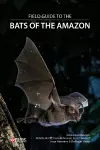
Field Guide to the Bats of the Amazon
6 authors - Paperback
£30.00
Adrià López-Baucells started working with the Bat Research Group, Granollers Museum of Natural Sciences (Catalonia), in 2005. Since then he has collaborated on several projects in fields such as habitat selection, biogeography, behaviour, and migration. He finished his BSc in Biology at the University of Barcelona in 2010 with a final project on neotropical bats based on fieldwork undertaken in Colombia. His MSc thesis was carried out in Sydney (Australia) on behavioural ecology and physiology in megachiroptera. Currently, he is studying as a PhD student under the supervision of Dr. Christoph Meyer, and Prof. Jorge Palmeirim. His PhD project uses autonomous ultrasound recording stations as a means of investigating the long-term impact of forest fragmentation on aerial insectivorous bats.
Ricardo Rocha has a BSc in Biology by the University of Lisbon and MSc in Conservation Science by Imperial College London with thesis dedicated to São Tomé endemic birds’ response to agricultural intensification. Following his MSc, he worked on the ecology of seabirds and endemic reptiles of the Selvagens archipelago (Portugal) and then moved to the Metapopulation Research Centre (Finland) to investigate the efficiency of Malagasy protected areas in reducing deforestation. He has since worked with bird and bat ecology in Madagascar, Kenya and Brazil. His PhD, based at the Universities of Lisbon and Helsinki and supervised by Christoph Meyer, Jorge Palmeirim and Mar Cabeza, addresses the effects tropical forest fragmentation on the spatiotemporal dynamics of phyllostomid bat communities. He has recently moved to the University of Madeira where he lectures biosystematics and zoology.
Paulo Bobrowiec is a bat researcher at the National Institute for Amazonian Research (INPA). He undertook a BSc in Biological Science at the Universidade Federal de Uberlândia and both a MSc and PhD at INPA. His main area of expertise is bat ecology and community structure, feeding strategies, and bat pollination and seed dispersal. His MSc was focused on the effect of secondary vegetation on bat communities, while his PhD was devoted to the feeding ecology of D. rotundus.
Enrico Bernard is a bat researcher and Professor of Conservation Biology at Universidade Federal de Pernambuco, Brazil. He carried out his BSc in Biology in the Universidade de São Paulo in Ribeirão Preto. His MSc was conducted in Ecology at INPA (Manaus), where he worked on the vertical stratification of bat communities. His PhD was obtained from York University, Toronto, Canada, and focused on the effects of forest fragmentation on Amazonian bats.
Jorge Palmeirim is Associate Professor at the University of Lisbon and member of its cE3c research center, where he coordinates the Conservation Ecology. He is also a member of the IUCN Species Survival Commission (Chiroptera Specialist Group). He studied Biology at the Universities of Luanda and Lisbon, followed by an MA and PhD in Systematics and Ecology at the University of Kansas. His main research interests are the ecology and conservation biology of bats and birds, and tropical ecology.
Christoph Meyer is a lecturer in Global Ecology and Conservation at the University of Salford, United Kingdom, and external collaborator of cE3c, University of Lisbon, Portugal. He holds an MSc degree from the University of Würzburg and a PhD from the University of Ulm (Germany). His research centres on investigating the effects of habitat fragmentation and land-use change on tropical bats, and he has a considerable track record of conducting ecological and conservation-related studies on bats in various tropical countries, including Brazil.